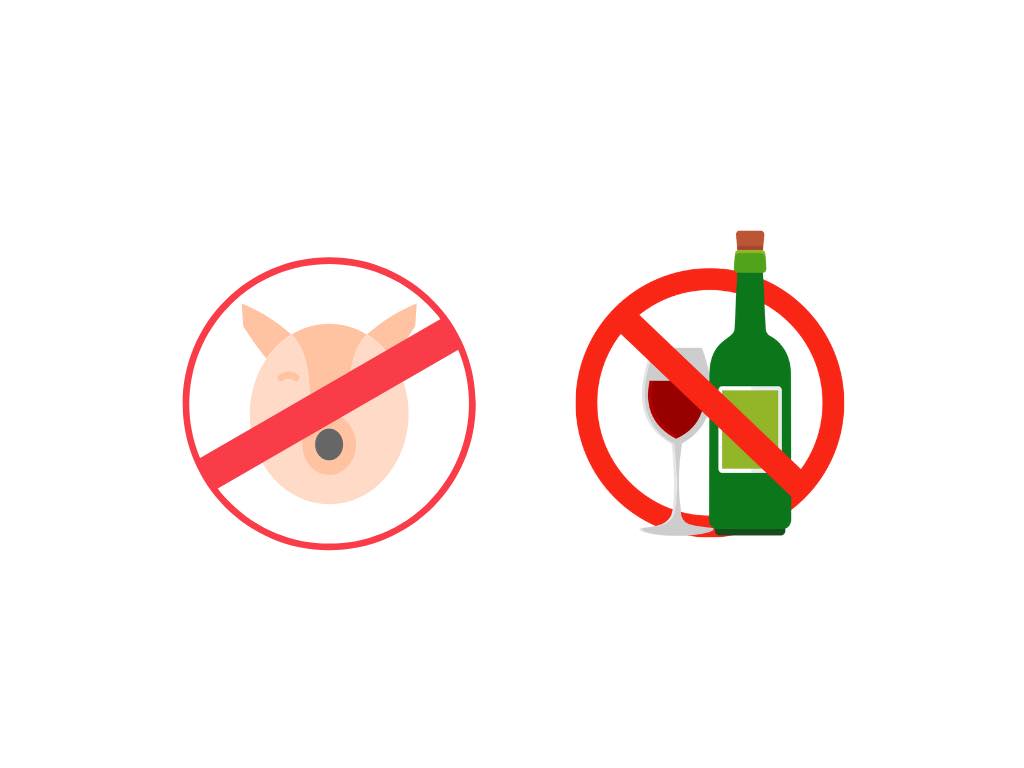
What Can't Muslims Eat? Knowing Islamic Dietary Restrictions
|
|
Time to read 5 min
Welcome to One Stop Halal!
Written by: Najma A.
|
|
Time to read 5 min
Islamic dietary laws are an essential aspect of the daily lives of Muslims, guiding them on what is permissible (Halal) and what is forbidden (Haram) to consume. These laws are derived from the Quran, the Hadith (sayings and actions of the Prophet Muhammad), and centuries of Islamic scholarship. In this blog, we will explore the types of food and drink that are prohibited for Muslims, the reasons behind these prohibitions, and the impact of these dietary laws on the lives of Muslims around the world. By the end, you will have a better idea about what can't Muslims eat.
Islamic dietary laws are primarily based on the Quran and the Hadith. The Quran provides clear guidelines on what is forbidden, and the Hadith complements these teachings with additional details. The key objective of these laws is to ensure that Muslims consume food and drink that are pure, healthy, and ethically sourced.
There are several categories of foods and drinks that are explicitly forbidden in Islam. Understanding these categories helps to clarify what Muslims cannot eat and why.
The most well-known prohibition is that of pork and pork products. This is explicitly stated in the Quran:
"He has only forbidden to you dead animals, blood, the flesh of swine, and that which has been dedicated to other than Allah" (Quran 2:173).
Pork is considered impure (najis) and harmful to consume. This prohibition extends to all forms of pork, including bacon, ham, sausages, and any food products containing pork derivatives like gelatin.
The consumption of alcohol and intoxicants is strictly prohibited in Islam. The Quran states:
"O you who have believed, indeed, intoxicants, gambling, [sacrificing on] stone alters [to other than Allah], and divining arrows are but defilement from the work of Satan, so avoid it that you may be successful" (Quran 5:90).
This prohibition includes all forms of alcoholic beverages, as well as any food or drink that contains alcohol. Additionally, other intoxicants, such as recreational drugs, are also forbidden.
Muslims are prohibited from consuming the flesh of animals that die of themselves, also known as carrion. The Quran explicitly mentions this in several verses, including:
"Forbidden to you (for food) are: dead meat, blood, the flesh of swine, and that on which hath been invoked the name of other than Allah" (Quran 5:3).
This prohibition ensures that the meat Muslims consume is fresh and free from potential contaminants or diseases that may be present in carrion.
The consumption of blood is also forbidden in Islam. This is mentioned in the same verse that prohibits carrion and pork. The prohibition of blood ensures that the food Muslims consume is pure and healthy, as consuming blood can pose health risks.
For meat to be considered Halal, it must be slaughtered according to Islamic law, a process known as Zabiha or Dhabiha. This involves invoking the name of Allah before swiftly cutting the animal's throat, allowing the blood to drain out. Meat from animals that are not slaughtered in this manner is considered Haram. The Quran states:
"Eat not of that upon which the name of Allah hath not been mentioned, for lo! it is abomination" (Quran 6:121).
Any animal sacrificed in the name of anyone other than Allah is considered Haram. This prohibition reinforces the monotheistic principle of Islam and ensures that the act of slaughtering is a form of worship directed solely to Allah.
In today's globalized world, Muslims must navigate complex food environments where processed foods often contain hidden Haram ingredients. Some common examples include:
To address these challenges, Muslims often look for Halal certification on food products, which guarantees that the food complies with Islamic dietary laws.
Halal certification is crucial for ensuring that food products meet the dietary requirements of Muslims. Certification agencies inspect and verify that the ingredients and processing methods used in food production comply with Islamic law. This certification helps Muslims make informed choices about what they can safely consume.
Welcome to your favorite butcher shop. We carry custom cuts of beef, chicken, lamb, goat, grass-fed beef, wagyu, deli, and more. We ship across the United States in 1-2 business days.
Islamic dietary laws significantly impact the social and cultural practices of Muslims. These laws influence not only what Muslims eat but also how they interact in social settings, such as:
Abstaining from Haram foods is not just about following rules; it is a form of worship and obedience to Allah. By adhering to these dietary laws, Muslims demonstrate their commitment to their faith and their desire to live a life that is pleasing to Allah. This obedience fosters a sense of discipline and self-control, which are important virtues in Islam.
There are several misconceptions about Islamic dietary laws that can lead to misunderstandings:
At One Stop Halal, you will find assorted collections of butcher cuts for various kinds of animals. All our products are locally harvested in the USA, ethically raised, and hand-slaughtered the old-fashioned way: by a man with a knife.
Understanding what Muslims cannot eat is key to appreciating the broader principles of Islamic dietary laws. These laws, derived from the Quran and Hadith, aim to ensure that Muslims consume food that is pure, healthy, and ethically sourced. The prohibitions against pork, alcohol, blood, carrion, improperly slaughtered animals, and food sacrificed to other deities reflect the emphasis on cleanliness, health, and spiritual discipline in Islam.
In today's complex food environment, Halal certification plays a crucial role in helping Muslims adhere to these dietary laws. By understanding and respecting these dietary restrictions, we can foster a more inclusive and respectful society.

© 2025 One Stop Halal, Inc.